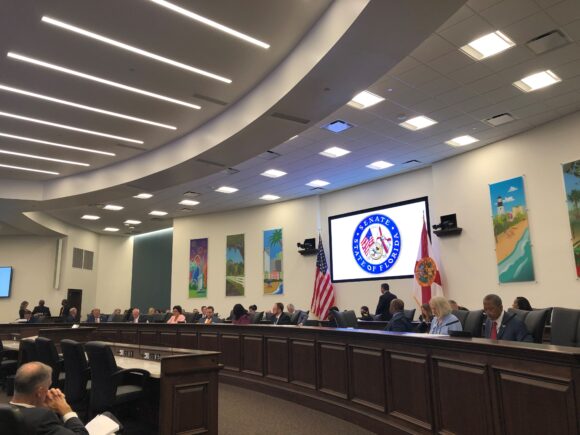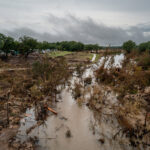A Florida Senate committee overwhelmingly approved two measures Monday that supporters believe will go a long way toward trimming roof claims, litigation expenses and reinsurance costs for beleagured property insurers – but not before some Democratic senators warned it would do little to reduce premiums in the short term.
“People are really hurting and we’re being tone deaf,” said Sen. Randolph Bracy, D-Orlando. “There’s a lot more we could be doing for the consumers.”
Sen. Lauren Book, D-Plantation, urged the Senate Appropriations Committee to adopt an amendment to Senate Bill 2D. Her plan would have frozen insurance rates for more than a year while claims litigation deterrents have time to make a difference.
![]() The amendment was voted down, but the committee voted 19-2 in favor of the bill itself, which would provide a wide range of fixes to Florida’s problem-plagued insurance market. The two “nay” votes were both Democrats, but six other Democrats voted in favor.
The amendment was voted down, but the committee voted 19-2 in favor of the bill itself, which would provide a wide range of fixes to Florida’s problem-plagued insurance market. The two “nay” votes were both Democrats, but six other Democrats voted in favor.
“It has bipartisan support now. It’s a bipartisan bill. That’s good,” said Michael Carlson, president of the Personal Insurance Federation of Florida, which represents a number of property insurers.
The Senate committee spent five hours debating SB 2D and a second bill, SB 4D, which would loosen part of the Florida building code that now requires full roof replacement in most cases when only 25% or more of a roof is damaged. The debate was lively at times, with full-throated opposition from trial lawyers, restoration companies and a few consumer-minded advocates.
But the fact that the bill was approved with only minor changes, just three days after it was drafted, is testament to the level of cooperation between Gov. Ron DeSantis and the Legislature. After the regular 2022 session of the Florida Legislature failed to enact significant reforms aimed at the insurance crisis, the governor last month called the five-day special session for this week. Sen. Jim Boyd, chair of the Senate Banking and Insurance Committee, said he had worked closely with the governor’s office and with House of Representatives leadership to draft the bills.
“I have full confidence the House will pass these bills,” Boyd said after the meeting.
The House Appropriations Committee takes up similar House measures on Tuesday.

The fact that a key element of SB 2D – the creation of a new, lower-level catastrophe reinsurance fund – would be backed by $2 billion from the Florida general fund is also testament to the fact that Florida state government is flush with cash and can spare the money in the event of a disastrous hurricane season.
“Florida is in a very good financial position now,” Boyd explained. He doubted that losses for participating insurers would ever wipe out the fund, resulting in a sales tax increase.
Instead of insurers paying premiums into the Reinsurance to Assist Policyholders fund, or RAP fund, participating insurers would be required to provide rate relief to their policyholders. The program would be for hurricane losses for one year only, to help some carriers who may not be able to otherwise afford reinsurance in the private market.
For those carriers who already have secured reinsurance this year, they could access the RAP fund next year, Boyd explained. One actuary has calculated that the plan could produce average premium reductions of as much as 4% for policyholders of participating insurers in the next several months.
But the debate Monday only lightly touched on the RAP fund savings, and some senators and speakers at the hearing worried that homeowners covered by other insurers won’t see lower premiums for 18 months. State Sen. Jeff Brandes warned that without greater assistance on reinsurance, several carriers will remain in dire straits and lawmakers could be forced to return to another special session in less than a month.
Some of the sharpest exchanges came between Sen. Jason Pizzo, D-Miami, and Florida Insurance Commissioner David Altmaier. Pizzo, an attorney, said that much blame has been heaped on plaintiffs’ lawyers and their fees, which SB 2D aims to limit. But despite a bill passed last year that requires insurers to track claims litigation information and report it to the Office of Insurance Regulation, the office has yet to finalize a regulation detailing the data call.
Pizzo argued that 2021’s Senate Bill 76 required the data by January of this year. But Altmaier said he read the law to mean that insurers should start collecting the data then and to report it to OIR in 2023. Boyd said it wasn’t clear but he would work with Altmaier to speed up the process.
The data could be helpful in determining the true costs of insurance claims litigation, on the claimants’ side and the insurance side, attorneys at the hearing said. Reggie Garcia, of the Florida Justice Association, a group of trial lawyers, said that insurance defense costs may be just as high as plaintiff’s attorney fees and should be examined before more limits are placed on policyholders’ legal rights.
Citizens Property Insurance Corp., the state-created property insurer of last resort, for example, is one of the few sources of information on that, Garcia said. Citizens spent $257 million on defense fees in the last three years, he said. A Citizens official confirmed the spending. Since 2017, the defense spending has topped $405 million, or an average of about $79 million per year. This year could be one of the highest if an early trend continues: Citizens spent $9 million in January alone.
Garcia also questioned the often-cited statistic that Florida has produced just about 8% of the homeowner claims in the U.S. but has seen as much as 79% of the claims litigation in the country. The data comes from the National Association of Insurance Commissioners, but Garcia said his research shows that the data did not include New York, North Dakota, 2021 Texas windstorm claims, and information from a number of carriers who have considered it to be a trade secret.
Boyd responded that if all that data were included in the NAIC report, Florida would likely still have more than 60% of the claims litigation in the country.
The hearing also brought up other sobering information.
Jerry Theodorou, director of the finance, insurance and trade policy program at R Street, a think tank that has studied Florida’s insurance troubles, said that his research shows that the national average for insurer defense and defense costs is about 1.2%.
“In Florida, it’s 6%,” Theodorou said. “That’s extremely high.”
The average combined ratio, a measure of profitability, in the country is 103%. In Florida, it’s 120%, and many Florida insurers have been unable to make up underwriting losses through investment income, he said.

Brandes, R-St. Petersburg, who has beaten the drum the loudest for insurance reform legislation, took issue with one part of Boyd’s SB 2D. The bill would forbid insurers from refusing to write policies for homes with roofs that are younger than 15 years. Several carriers in the last two years have already stopped writing for roofs of 10 years old or less.
“No other state, not even California, has the 15-year requirement,” Brandes said. “You’re forcing insurers to write older roofs, and that’s really all they have” to limit underwriting losses.
He urged colleagues to remove the restriction, but his amendment failed.
Carlson said his association members also have had some heartburn over the 15-year restriction. The National Association of Mutual Insurance Companies also said after the hearing that its members are concerned about the provisions in the bill “that restrict insurers’ ability to set appropriate rates that reflect risk, particularly in deciding which properties and roofs to insure.”
Otherwise, “the package, while not perfect, makes much-needed progress in substantially reforming the litigation environment that has allowed rampant lawsuit abuse in Florida in recent years and has sent the marketplace into a slow-motion collapse,” Caitlin Murray, NAMIC regional vice president for the Southeast, said in a statement.
The Consumer Protection Coalition, led by the Florida Chamber of Commerce, praised the legislation but noted that, if signed into law, may face legal challenges in court and will probably need further tweaks next year. A statement from the coalition noted that the special session already “stands in sharp contrast to the state’s last special session on property insurance in 2007, which led to massive expansions of Citizens Property Insurance Corp. and the Florida Hurricane Catastrophe Fund,” and did not address the root causes of a dysfunctional marketplace.
Brandes also raised a question about the interplay of the two bills, which no one could answer. If more roofs are repaired instead of replaced in coming years, per the building-code legislation, and part of a home’s roof is repaired at year one, and another part at year five, how old is the roof, Brandes asked.
“I think that is something we’ll probably need to clarify,” Boyd said.
Was this article valuable?
Here are more articles you may enjoy.



 Why Experts Say States Need to Get in the Business of Floodplain Buyouts
Why Experts Say States Need to Get in the Business of Floodplain Buyouts  Cybersecurity Pros Say IoT, Large Language Models Are Risk Areas of Concern
Cybersecurity Pros Say IoT, Large Language Models Are Risk Areas of Concern  Two South Carolina Women Charged With Fake Hit-and-Run Scam
Two South Carolina Women Charged With Fake Hit-and-Run Scam  Helicopter Crash Kills 2 Workers Repairing Powerlines Near Mississippi River
Helicopter Crash Kills 2 Workers Repairing Powerlines Near Mississippi River 


